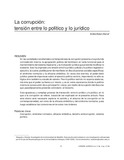La corrupción: tensión entre lo político y lo jurídico
Share this
Date
2004-12-31Author
Botero Bernal, Andrés
Citación
Metadata
Show full item recordDocuments PDF
Abstract
In the contemporary western societies corruption presents a deep internal contradiction: the political appropriation of the phenomenon because it ends to be functional for the maintenance of the system, and the juridic motivation that it tries to modify the status quo. This has created a tension between the law-judicial and the politic-legislative-executive. This tension is visible in two specific social situations: the normative syndrome and the symbolic effectiveness. In these two events, the law tries to prevail on the political praxis, imposing not only its logic but also its value system. But politics does not accept ties, since power reproduces itself; it’s in these spaces when politics reaches it’s main goal: to grow. This growth is paradoxically attained through the very same subject that it tries to control: the law This complex process of interaction between politics and law, in corruption, is the objetive of this essay. Por this purpose will will be necessary to explore the meaning and the scope of corruption today, as well as the symbolic effectiveness and the normative syndrome, in order to try to establish the connections between these three concepts. En las sociedades occidentales contemporáneas la corrupción presenta una profunda contradicción interna: la apropiación política del fenómeno en tanto funcional para el mantenimiento del sistema imperante, y la motivación jurídica que pretende modificar lo existente. Esto ha originado una tensión entre lo jurídico-judicial y lo político-legislativo-ejecutivo, la cual es posible poner de manifiesto en dos situaciones sociales específicas: el síndrome normativo y la eficacia simbólica. En estos dos eventos, el poder-decir jurídico pretende imponerse sobre el ejercicio político estricto, imponiendo no sólo su lógica sino también su escala de valores. Pero lo político estricto no soporta ataduras, máxime que el poder se llama a sí mismo, y es en estos escenarios donde lo político intenta la consecución de su principal fin: crecer, por medio de la sujeción del discurso que paradójicamente pretende controlarlo: el Derecho.Este aparatoso y complejo proceso de interacción entre lo jurídico y lo político, en lo que a la corrupción se refiere, tratará de ser explicado en el presente artículo. Para este efecto será necesario explorar el sentido y el alcance de la corrupción en la contemporaneidad, así como de la eficacia simbólica y del síndrome normativo, para luego establecer las conexiones entre estos tres órdenes.
URI
http://revistas.udem.edu.co/index.php/opinion/article/view/1314http://hdl.handle.net/11407/1751


